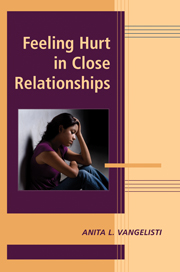Book contents
- Frontmatter
- Contents
- List of Contributors
- Foreword
- PART I INTRODUCTION
- PART II CONCEPTUALIZING HURT
- PART III HURTFUL ACTS
- 7 Rejection: Resolving the Paradox of Emotional Numbness after Exclusion
- 8 Conflict and Hurt in Close Relationships
- 9 When the Truth Hurts: Deception in the Name of Kindness
- 10 Affairs and Infidelity
- 11 Aggression, Violence, and Hurt in Close Relationships
- PART IV HURT IN RELATIONAL CONTEXTS
- PART V HURT IN APPLIED CONTEXTS
- Author Index
- Subject Index
- References
7 - Rejection: Resolving the Paradox of Emotional Numbness after Exclusion
from PART III - HURTFUL ACTS
Published online by Cambridge University Press: 04 August 2010
- Frontmatter
- Contents
- List of Contributors
- Foreword
- PART I INTRODUCTION
- PART II CONCEPTUALIZING HURT
- PART III HURTFUL ACTS
- 7 Rejection: Resolving the Paradox of Emotional Numbness after Exclusion
- 8 Conflict and Hurt in Close Relationships
- 9 When the Truth Hurts: Deception in the Name of Kindness
- 10 Affairs and Infidelity
- 11 Aggression, Violence, and Hurt in Close Relationships
- PART IV HURT IN RELATIONAL CONTEXTS
- PART V HURT IN APPLIED CONTEXTS
- Author Index
- Subject Index
- References
Summary
The need for positive and stable relationships is among the most basic and fundamental of human needs. Like the need for food, shelter, and sleep, the need to belong is deeply rooted within evolutionary history and has a profound influence on contemporary psychological processes (Baumeister & Leary, 1995). Given the fundamental nature of the need to belong, it would seem somewhat straightforward that social exclusion would cause dramatic increases in emotional distress. This increased emotion distress after social exclusion should, in turn, cause various behavioral responses. Despite the intuitive appeal of this hypothesized model, converging evidence points to an altered perspective regarding how people respond to social exclusion. Multiple studies have shown that the behavioral effects of social exclusion are quite large (Baumeister, Twenge, & Nuss, 2002; Buckley, Winkel, & Leary, 2004), but the emotional effects are frequently small or nonexistent. Socially excluded participants often report emotional states that do not differ from those of participants in accepted or control conditions (Baumeister, DeWall, Ciaracco, & Twenge, 2005; Gardner, Pickett, & Brewer, 2000; Twenge, Baumeister, Tice, & Stucke, 2001; Zadro, Williams, & Richardson, 2004). Psychologists are therefore confronted with a paradox as to why people respond to such a momentous event as social exclusion with relative emotional detachment and numbness.
- Type
- Chapter
- Information
- Feeling Hurt in Close Relationships , pp. 123 - 142Publisher: Cambridge University PressPrint publication year: 2009
References
- 11
- Cited by

